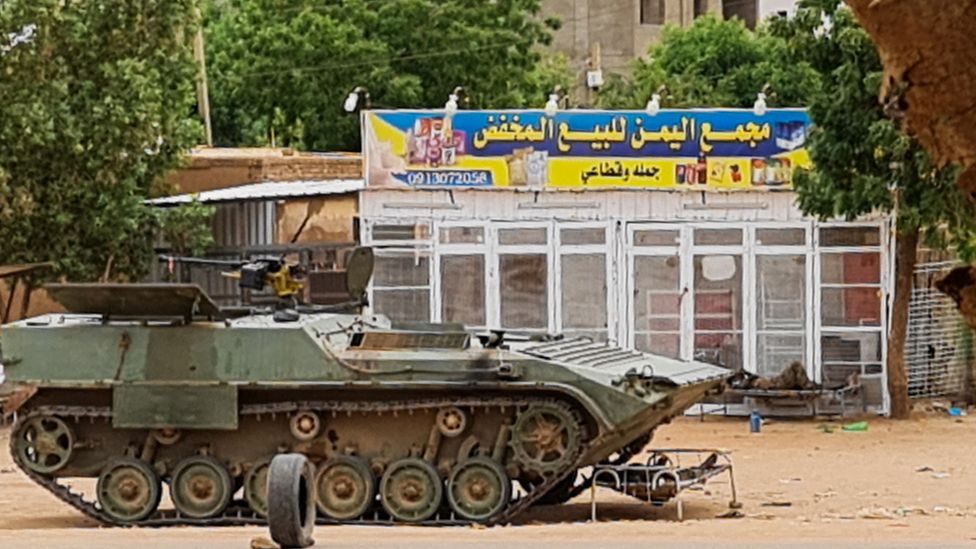Air strikes have pounded Sudan’s capital, Khartoum, despite a truce aimed at allowing civilians to flee.
The army said it was attacking the city to flush out its paramilitary rivals, the Rapid Support Forces (RSF).
The fighting intensified even as the warring sides said they would extend the truce by another three days.
More than 500 deaths have been reported with the true number of casualties believed to be much higher. Millions remain trapped in Khartoum.
Read Also: Banana artwork in Seoul museum eaten by visitor
Army commander Gen Abdel Fattah al-Burhan and RSF chief Gen Mohamed Hamdan Dagalo, better known as Hemedti, are vying for power – and disagree in particular about plans to include the RSF into the army.
The generals agreed a humanitarian truce after intensive diplomatic efforts by neighbouring countries, the US, UK and UN. It was extended, but did not hold.
However, it remains unclear on what they will do in the next stage of the deal arrived at with US and Saudi mediation, according to the army.
The country is now in a civil war, says Sudanese businessman and philanthropist Mo Ibrahim, and its conflict must not be allowed to spill over its borders and become regional.
“We don’t want another Syria,” he told the BBC, adding that it was difficult for either side to win outright.
BBC diplomatic correspondent Paul Adams, who is monitoring events from the Kenyan capital, Nairobi, says the fighting is concentrated mainly in the north of Khartoum, close to the confluence of the Blue and White Niles, but right across the city, people are huddled in their homes, wondering whether it is more dangerous to stay or leave.
The army will find it difficult to expel the RSF from Khartoum – for all the army’s superior firepower, the paramilitaries are highly mobile and more suited to urban warfare, our correspondent adds.
Before the announcement of the extension on Sunday, the army said it had conducted operations against RSF troops north of the city centre.
Checkpoint ‘gamble’
On Monday, the World Food Programme announced that it was resuming its operations in Sudan, reversing its decision to pull out two weeks ago, after three of its staff were killed when fighting erupted in Khartoum.

Hamid Khalafallah, from the Tahrir Institute for Middle East Policy, is one of those unable to flee.
“When there is very loud bombing and it gets closer, we take shelter in the house, try to all come to a central room, far from windows, far from walls, and so on, and just lie on the floor until it passes.
“When it’s a bit further, we try to use the quiet hours that we get – a couple of hours a day – to just quickly go out and get what we need which is also very risky but we have to do it,” he told BBC Newsday.
Mr Khalafallah said his neighbourhood was dotted with RSF checkpoints, with people risking their lives every time they had to negotiate their way past.
“It’s basically a gamble. Sometimes they let you through, sometimes they don’t. Sometimes they shoot at you, sometimes they steal your things and it’s very random,” he added.
Mr Khalafallah said he has not had a “single drop of water” at his home since fighting started on 15 April, and he was getting it from neighbours who had wells at their homes.
The first major aid flight, laden with medical supplies, has arrived in the country.
The International Committee of the Red Cross (ICRC) says a plane landed at Port Sudan with eight tonnes of relief supplies, including health kits for hospitals.
“With hostilities still ongoing, ICRC teams will need guarantees of safe passage from the parties to the conflict to deliver this material to medical facilities in locations with active fighting, such as Khartoum,” a statement said.
More than 70% of health facilities in the capital have been forced to close as a result of the fighting that erupted on 15 April.
Foreign countries have been evacuating their nationals amid the chaos.
The UK government announced on Sunday that it would organise a final evacuation flight on Monday – two days after it said it had ended its operation to bring British nationals out. The Foreign Office (FCDO) advised those wishing to leave to travel to the evacuation point in Port Sudan before 12:00 (10:00 GMT). So far, 2,122 people have been evacuated, the FCDO statement said.
A US-organised convoy has reached Port Sudan to evacuate more US citizens by ship to Jeddah in Saudi Arabia. It said hundreds of Americans had already left, in addition to the diplomats evacuated by air a week ago.
SOURCE: BBCNEWS





























